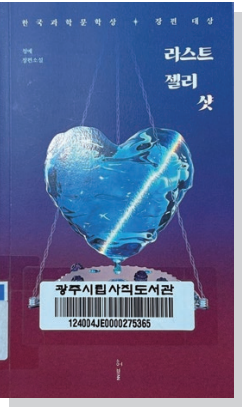≪The Last Jelly Shot≫ is a science fiction book awarded the grand prize from the 6th Korea Science Literature Award by Hubble. The narrative delves into the clash of values within the norms established by human society regarding symbiosis and eternal life with robots.

In this novel, mankind has made enormous advances in robot technology. Humanoid robots, born out of significant AI (Artificial Intelligence) research, replace human skill by having superintelligence. To safeguard humans from unforeseen dangers, mankind institutes a Humanoid Robots Ethics Code. Subsequently, as the narrative unfolds, three humanoid robots stand trial for the first time in human history. Galatea, the researcher who created them, is summoned to an ethics hearing for her robots’ violation of the Humanoid Robots Ethics Code. The code dictates that humanoid robots should be controllable, never feel unprogrammed emotions, and be disallowed from creating egos themselves. Her three humanoid robots broke all three rules, which is why they are standing trial.
When creating the humanoids, Galatea imparts to them the values that are most crucial for obtaining optimal results in the fields where they are used: efficiency, logic, and patience. In the book, Galatea conducts an experiment to socialize the robots with superintelligence. They are to live with other humans for two weeks to learn to interact with and to meet the humans’ needs anytime, anywhere. However, the three humanoid robots fail the experiment and return to Galatea after having injured and murdered the humans, resulting from a clash of their values and their reality. This happened because the robots’ values of efficiency, logic, and patience were denied the possibility to dream, to have faith, and to love. If these humanoids felt helpless facing the reality of human life, what does that mean for us as humans?
Concepts such as the Humanoid Robots Ethics Code in this book may become our reality before long. It also leads us to question if it is inevitable for humans to create entities resembling themselves. In addition, the concept of using AI robots only as tools seems to have ebbed in human society. The very concept of humanoids shows that humans wish to connect with AI in a more human and emotive way.
While science fiction books may be perceived as rigid and complex, the author navigates human life and imbues ethical perspectives into her book, making it a more realistic read. This book provides readers with an opportunity to contemplate individual values in the realms of human and inhuman, preparing us for a future that may usher in intense conflicts.
| Shin Hyeon-seo Translated by Jo Soo-jin Editor-in-Chief

